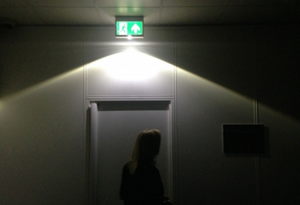Travel behaviour and traffic operations in case of exceptional events
Subject
Influences of adverse conditions on the egress behaviour of pedestrians in buildings and on the route choice/walking behaviour of pedestrians in crowds.
Scientific challenges
With regard to the egress behaviour in buildings it is considered a challenge in this research project to find a good balance between the ethical boundaries and the design of a realistic stressful situation in a controlled environment. Stress has all kinds of effects on several cognitive functions. Some of these effects are positive: it produces the fight or flight response. But, there are also various negative effects, for instance: people could freeze under threat. One way to study the effects of stress on the human cognitive functions during stressful circumstances is in a controlled environment. It is difficult in an experiment to create a realistic situation and a similar stress level as people would experience in case they are confronted with real threats. These will be the biggest challenges!

Societal relevance
Insights into how people behave under adverse conditions in egress situations and in crowds could not only be relevant information for emergency evacuation planners or professionals working with crowds, it could also be useful information to further refine and improve simulation models in this respect. Large gatherings of individuals are prone to small incidents that eventually could lead to big incidents, where people could get seriously injured or possibly even perish. Social psychological research to how people react and behave in adverse conditions is necessary. No one wants people to perish or get injured, for instance, during building evacuations or in crowded stadiums.

Erica KinkelStart/end date: 15 May 2013 – 14 May 2017Daily supervisor: Winnie Daamen Promotor: Serge P. Hoogendoorn |